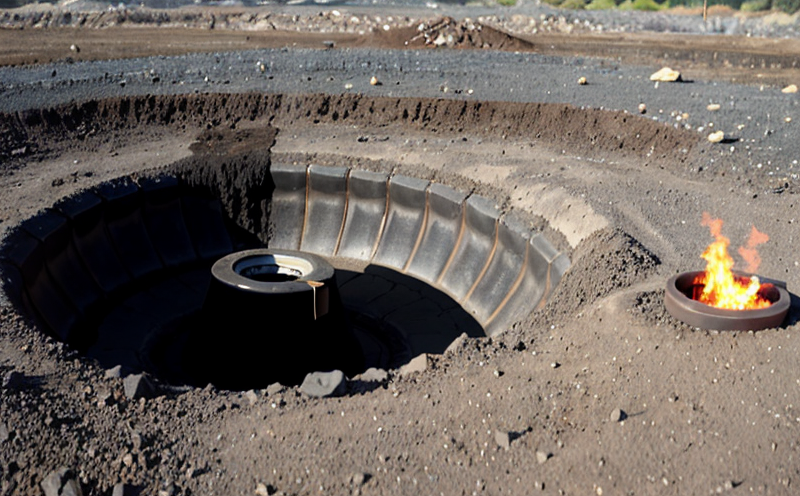EN 14918 Calorific Value of Solid Fuels Testing
The EN 14918 standard provides a method to determine the calorific value (CV) of solid fuels, which is crucial for understanding their energy content. This test is especially important in sectors like mining and fossil fuel production as it helps in assessing the quality and efficiency of coal and other solid fuels used in various industrial processes.
The calorific value is a measure of the potential heat released by combusting a specified quantity of the sample, typically under controlled conditions. It is expressed in megajoules per kilogram (MJ/kg) or British thermal units per pound (BTU/lb). This test ensures that fuels meet specific quality standards, thereby optimizing operational efficiency and ensuring safety.
In mining and fossil fuel testing, accurate calorific value measurements are vital for several reasons:
- Evaluation of coal quality: Ensures consistent product quality and meets customer expectations.
- Optimization of combustion processes: Helps in optimizing the combustion process to maximize efficiency and minimize emissions.
- Compliance with regulations: Ensures compliance with international standards and local regulations regarding fuel specifications.
The test involves several steps, starting with proper sample preparation. The specimen must be representative of the bulk material and free from contamination. Once prepared, the sample is ignited in a bomb calorimeter under controlled conditions. The temperature increase measured during combustion is used to calculate the calorific value based on known heat capacities.
Understanding the context within which this test operates helps in appreciating its significance:
- Quality Management: Ensures that all fuels meet set quality standards, enhancing operational efficiency and reducing waste.
- Compliance Officers: Helps ensure compliance with international standards like EN 14918, thereby avoiding legal penalties and ensuring safe operations.
- R&D Engineers: Provides critical data for research and development of new fuel types and combustion processes.
- Procurement: Ensures that the purchased fuels meet specific requirements, reducing risks associated with substandard materials.
The test results are used to make informed decisions regarding fuel usage, which can lead to significant cost savings and environmental benefits. For instance, accurate calorific value measurements allow for better process control, leading to reduced waste and lower emissions.
Given the importance of this testing method in the mining industry, it is essential that laboratories adhering to EN 14918 are equipped with state-of-the-art equipment and trained personnel. This ensures reliable and accurate test results that can be trusted by all stakeholders involved in solid fuel production and utilization.
Why Choose This Test
Selecting EN 14918 calorific value testing is advantageous for several reasons:
- Achieving Precision: The method provides precise and accurate results, which are essential for making informed decisions about fuel quality.
- Enhancing Efficiency: By ensuring that fuels meet specific standards, this test helps in optimizing combustion processes and reducing operational costs.
- Ensuring Compliance: Adhering to international standards like EN 14918 ensures compliance with regulations, avoiding legal penalties and maintaining a safe working environment.
The reliability of the results obtained from this test is crucial for all stakeholders involved in solid fuel production. The method provides consistent data that can be used to make informed decisions, ensuring that fuels meet the required specifications and comply with international standards.
For mining companies, accurate calorific value measurements ensure that they are delivering high-quality products to their customers, which enhances reputation and customer satisfaction. For fossil fuel producers, this test helps in optimizing production processes and reducing waste, leading to cost savings.
International Acceptance and Recognition
The EN 14918 standard is widely recognized and accepted across the globe for its precision and reliability. This ensures that results from different laboratories are comparable, providing confidence in the accuracy of the measurements.
Many countries have adopted this standard as a benchmark for calorific value testing due to its rigorous methodology and consistent results. The acceptance of EN 14918 is particularly significant in industries where fuel quality is critical, such as mining and fossil fuel production.
The international recognition of the EN 14918 method enhances the credibility of test results worldwide. This standardization ensures that all stakeholders, from manufacturers to end-users, can rely on consistent and accurate measurements. The widespread adoption also facilitates global trade in solid fuels by ensuring uniform quality standards.
Use Cases and Application Examples
The EN 14918 calorific value test finds applications in various sectors:
- Coal Mining: Ensures that coal meets specific quality standards, optimizing production processes and ensuring compliance with international regulations.
- Fossil Fuel Production: Provides critical data for fuel quality assessment, aiding in the development of efficient combustion processes.
- Emission Control: Helps in monitoring and controlling emissions by providing accurate calorific value measurements, which are essential for meeting environmental standards.
In practice, this test is used to evaluate different types of coal and other solid fuels. For instance, it can be used to assess the quality of anthracite, bituminous coal, lignite, and peat. The results from this test are crucial in optimizing combustion processes in power plants and industrial furnaces.
Additionally, the test is valuable for research purposes, helping engineers and scientists develop new fuel types and combustion technologies. It also supports procurement activities by ensuring that purchased fuels meet specific requirements, reducing risks associated with substandard materials.





